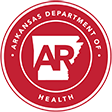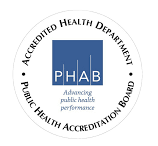Rabies Laboratory Services
Rabies Laboratory
Additional information about rabies can be found at the ADH Rabies Section website.
Rabies is an infectious viral disease that affects the nervous system of humans and other mammals. People should submit an animal specimen if bitten by an animal suspected of having a rabies infection such as a raccoon, skunk, fox, coyote, bat, dog, cat or any mammal. It is rare for rodents such as mice and rabbits to be infected with the rabies virus. It is also possible that people may get rabies if infectious material from a rabid animal, such as saliva, gets directly into an open wound and in rare cases through the eyes, nose or mouth.
The Arkansas Department of Health - Public Health Laboratory has assembled shipping containers for packaging and transporting the specimen to the rabies laboratory. These containers are available at every local Health Unit.
The laboratory only accepts the heads, or brains, of any animal except small mammals, such as bats, mice or squirrels which may be submitted whole. It is preferable to have a veterinarian or animal control officer remove the head prior to submitting the specimen. If a citizen decides to remove the head they must use appropriate protective clothing including waterproof gloves (preferably disposable), a mask (disposable or launderable), safety glasses or goggles and coveralls and/or a waterproof apron. For larger animals, such as livestock, it is necessary to submit only the brain since transportation is too difficult with animals of this size. When submitting the brain instead of the entire head, care should be taken to ensure the brain stem is included and intact.
Remove the head of the animal without damaging the brain. Place the specimen in the large Ziploc bag provided in the shipping container and seal it shut. This bag should then be placed inside the second Ziploc bag and sealed. Chill the specimen in a refrigerator or on cold packs prior to packaging. Cold packs are provided with the shipping container, but must be frozen prior to use. It is extremely important to keep the specimen cool prior to and during shipment to retard decomposition of the specimen. Freezing the specimen is also acceptable but will delay results due to the thawing process.
For proper shipment of the specimen, place the Ziploc bag containing the animal head/brain and at least two (2) cold packs inside the Styrofoam container that is inserted in the white plastic bucket. Replace the Styrofoam lid onto the container with the specimen and cold packs inside. More than two cold packs may be necessary for larger specimens. Fill out the Rabies Examination Form (HL-12) and place the form on top of the lid of the Styrofoam container. Do not place the form inside the Styrofoam container with the specimen. Place the plastic lid on the plastic bucket and snap it shut. This may require a hammer to ensure a complete seal. Put the plastic bucket inside the cardboard box provided and tape it shut. Also, tape an envelope with the lab address on the outside of the box. Deliver the specimen as soon as possible to your nearest local health unit for delivery to the laboratory. Alternatively, the specimen may be shipped by UPS on Monday through Thursday only or brought directly to the laboratory any day of the week at the address below.
Arkansas Department of Health
Public Health Laboratory
201 South Monroe
Little Rock, AR 72205
Face-bites to a human being from a suspected infected animal are considered emergency situations and the laboratory will test the suspected animal. A family physician should be notified immediately as well as the ADH Public Health Veterinarian at 501-661-2381 for emergency situations. If bitten on the face, seek help as quickly as possible.
The Specimen Receiving Laboratory accepts samples M-F 8:00 a.m. – 4:00 p.m. at the back door of the laboratory. This is the entrance off Palm Street labeled the “Sample Receiving Dock.”
If the specimen is received before 10:00 am on a given day, results should be ready by the end of the working day at 4:30 pm. If received after 10:00 am, the specimen is tested the next working day unless the situation is an emergency. If for some reason the test fails, the specimens will be retested the following day unless of an emergency.
The laboratory does not charge for the rabies virus test. It is offered as a public health service to the community. Veterinarians may charge for removal of the head and for transportation costs for submission to the rabies laboratory. Arkansas Livestock and Poultry Commision also charges to remove brain tissue from large animals and for disposal of the carcass and transportation of the specimen to the laboratory. The laboratory is not responsible for any charges.
Results are called directly to the submitting facility by the laboratory’s administrative area or by the analyst conducting the test. If a result is positive, an epidemiologist or physician is notified as well as anyone with an exposure to the animal, so that proper treatment can be administered to the exposed.
Samples that are decomposed, damaged or formalinized are unsuitable for testing. Do not shoot or damage the animal head in any form. A correctly submitted specimen must also possess the three following parts of the brain tissue of the animal: brain stem, hippocampus and cerebellum.
Resources
- ADH Rabies
- Center for Disease Control
- Center for Disease Control Bats and Rabies
- Rabies Examination Form
ADH Rabies Laboratory
Rabies Microbiologist 501-661-2840
Rabies Laboratory Supervisor 501-671-1429
For questions concerning treatment, care or other related topics concerning rabies, the State Public Health Veterinarian at 501-661-2381 should be contacted at the ADH. The laboratory will answer questions only related to issues concerning laboratory testing and results.


